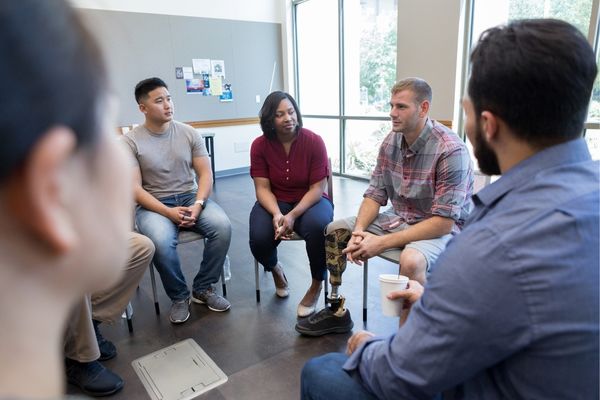Alcoholics Anonymous is a peer-based support group that’s open to people of all ages, races, and faiths. Both the individuals who struggle with a drinking problem and those who love them can attend AA meets to learn, share, and find empathy with one another. However, that’s not to say that anyone can just turn up to an AA meeting on any given day. Before dropping in, you’ll need to know the difference between an open and a closed AA meeting.
What is a closed AA meeting?
Open AA meetings are ones that anyone can attend. This means newcomers who are attending their very first AA meeting and want to learn more about the organization as well as non-alcoholics—the friends, family, or coworkers of those with a drinking problem.
The majority of AA meetings, however, are closed. This means that they are limited to current and prospective AA members. There’s no formal membership process in Alcoholics Anonymous so it’s at the discretion of the individual to determine whether they meet the criteria for closed meetings.
This status of a meeting is usually denoted by the abbreviation ‘OD’ for open discussion or ‘CD’ for closed discussion.
Can I attend a closed AA meeting?
If you’re not sure if this applies to you, refer to Tradition 3—the only thing required is the genuine desire to stop drinking alcohol. If you’ve been attending meetings of the same AA group, you would likely be eligible to go to a closed meeting. If you’re still floating between AA meetings looking for a home group, it could also be a good idea to check with the group beforehand whether you’re considered a member or not.
Why are some meetings not open to everyone?
Understandably, addiction can be a very sensitive topic. It can take people to dark places that are hard to talk about. Limiting group attendance to those who have committed to the Alcoholics Anonymous ways of operation, namely confidentiality and anonymity, creates an atmosphere where individuals feel more comfortable speaking openly, honestly, and freely.
The purpose of AA meetings that are available to the general public is to help people learn more about the organization, how meetings are structured, or hear first-hand what dealing with alcoholism is like. It can provide valuable perspective for loved ones who attend Al-Anon or Alateen meetings and also help someone identify whether or not they or someone else is experiencing the same thing.
Open vs closed AA meetings: How are they different?
The primary difference between open and closed AA meetings is that even with open meetings, it’s typically requested that only members or individuals with alcoholism speak and the newcomers listen and observe.
Additionally, when the Seventh Tradition collection comes around, non-members will be asked to refrain from contributing (“Every A.A. group ought to be fully self-supporting, declining outside contributions”).
Aside from those differences, the designation of an open or closed meeting does not inherently determine the format or focus of that meeting. Both open and closed meetings may apply to the various meeting formats: discussion meetings, speaker meetings, or literature meetings.
Where to find open AA meetings
If you’re trying to locate an AA meeting to attend, the easiest way to find them is online. Many groups will post meeting schedules and details ahead of time. When in doubt, the best option is to call ahead and ask.
AA meeting advice for beginners
If it’s your first time going to a meeting and you are interested in potentially joining, keep an eye out for beginner meetings. These are geared specifically toward newcomers and tend to focus on the first three of the 12 Steps as an introduction to the organization.
If you’re a newbie and can’t find a beginner meeting at the AA groups near you, another great way to get a feel for the organization, and particularly the people of that group, is to go there early. Lovingly referred to as “the meeting before the meeting”, some members get there early to assist with setting up.
During this time you have a greater opportunity to make introductions, speak with people individually, and get a one-on-one explanation of that group’s meeting format and what’s coming up. Having an idea of what to expect in an AA meeting is a great way to calm any nervousness you may have about joining for the first time. It’s also the perfect opportunity to let others know ahead of time if you don’t want to introduce yourself or any other specific accommodations you might need.
